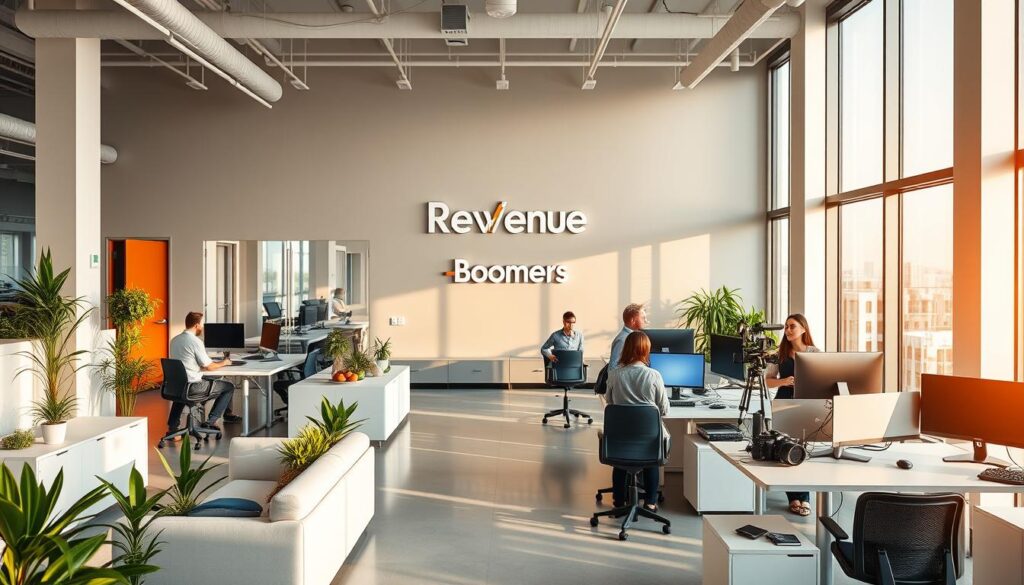Have you thought about how your online presence affects your job chances? Today, social media changes how we interact and how people see us. It’s not just about your skills anymore; you need a strong personal brand to stand out.
Creating a solid personal brand is key for your career and visibility. As industries grow, personal branding is linked to who you are. It’s about managing how you’re seen online and offline. It helps you show your true self and draw in new chances. We’ll explore what makes up your personal brand, why it’s crucial, and how to grow it.
Key Takeaways
- Personal branding is essential for success in today’s competitive job market.
- An effective personal brand not only reflects one’s identity but also shapes consumer perceptions.
- Authenticity and trust are significant benefits of developing a personal brand.
- Engaging with online communities can provide professionals with a distinct advantage.
- Transitioning from corporate to entrepreneurial roles highlights the need for strong personal branding.
- Consistent messaging and storytelling are vital to maintaining an impactful personal brand.
Understanding Personal Branding
Personal branding is about making a clear and strategic image of yourself in your career. It’s about being known for who you are and what you stand for. In today’s world, having a strong personal brand helps you stand out.
By focusing on personal branding, you can find jobs and opportunities that fit who you are. It boosts your confidence and helps you set clear goals. It also helps you feel more like you belong in your career.
To build a strong personal brand, start by knowing your values and goals. Look at your skills, connections, and reputation to understand your place in the market. Then, tell your story in a way that shows your worth.
How you communicate is key to your brand. Use different ways to share your message and be real in person. Connect with others to support your brand. Remember, personal branding is a journey that needs constant updates.
In today’s digital age, with 810 million LinkedIn users, personal branding is more important than ever. About 70% of employers check social media before hiring. So, it’s crucial to have a strong online presence.
Research shows that people are more likely to buy from brands they know. A good personal brand can open doors to new opportunities. This can include jobs, speaking gigs, and more, depending on your field.
Knowing your competitors and their strategies is important. It helps you stand out in the market. Do your research to create a personal branding plan that makes you unique.
What Constitutes Your Personal Brand
A personal brand is about the values, experiences, and traits you share with the world. It’s about picking certain parts of your personality to show the best side of you. This is key to building a strong personal brand.
Key elements of a strong personal brand include:
- Image: The visuals and aesthetic you present, which should align with your core values.
- Communication Style: The tone and manner in which you interact with others can significantly impact how your brand is perceived.
- Professional Achievements: Showcasing your skills and accomplishments helps establish your credibility and authority in your field.
Knowing these parts helps you shape your reputation and improve how you connect with others. Personal branding is not just about promoting yourself. It’s about being real and open to build trust and lasting connections.
Your online presence, through social media and professional sites, is crucial in defining your brand. Studies show 81% of people research online before making choices. So, it’s vital to manage your online image well.
Building a strong personal brand means being consistent across all platforms. This helps you stand out and build a good reputation in your field.
Importance of Personal Branding
Personal branding is key in today’s job world. It shapes how others see you at work. It’s vital to show who you are and what you offer.
By managing how you’re seen, you open up new career paths. This is crucial in a competitive job market.
How It Shapes Professional Identity
Good personal branding lets you tell your story. It makes sure your work life matches your values. A strong brand shows you know your stuff and are trustworthy.
People with a strong brand are seen as leaders. They get noticed more, leading to new chances and recognition.
Impact on Career Advancement
Personal branding helps you stand out in a busy job market. It shows you’re professional and in charge. This is great for job interviews and getting ahead.
Companies prefer candidates with a clear brand. This can lead to better jobs and higher pay. It’s a big reason to keep working on your personal brand.
Benefits of Developing Your Personal Brand
Creating your personal brand has many benefits in today’s world. It helps you build trust, credibility, and visibility. This section will look at how authenticity and trust, and increased visibility and opportunities, are key to a strong personal brand.
Authenticity and Trust
Being authentic is key in personal branding. A study found that 89% of customers stick with brands that share their values. This bond is crucial for trust.
When you show your true self, you connect with people. This shows vulnerability and integrity. In fact, 76% of consumers say brand authenticity affects their choices. This shows how important being genuine is.
Increased Visibility and Opportunities
A strong personal brand means more visibility. Research shows 67% of employers look at personal brands when hiring. This means you’re more likely to get job opportunities.
Also, companies with strong personal brands make 21% more money than others. This shows the financial benefits of personal branding. It also opens doors for collaborations and networking.

| Benefit | Statistic |
|---|---|
| Brand Loyalty | 89% of customers stay loyal to brands that share their values |
| Importance of Authenticity | 76% of consumers value brand authenticity |
| Hiring Decisions | 67% of employers influenced by a strong personal brand |
| Revenue Increase | Companies with strong personal brands generate 21% more revenue |
Crafting Your Personal Branding Strategy
In 2024, personal branding goes beyond just being online. It’s about how you interact and connect with others in real life. Having a strong personal brand is key to boosting your career and business. Without a solid plan, it’s hard to stand out in the market.
Begin by figuring out what makes you unique and valuable. Knowing who you’re talking to helps you speak their language. Setting clear goals makes your strategy stronger. This clarity helps you tell a story that grabs your audience’s attention.
Being consistent in what you say and do helps build your brand. Keeping your message fresh by sharing new skills and experiences keeps you relevant. Use social media to share insights and connect with your community. This can open doors to new opportunities and career growth.
Regularly engaging with your audience builds trust and loyalty. A strong personal brand makes you a go-to expert in your field. Staying up-to-date with trends shows you’re a leader in your industry.
A well-thought-out personal branding strategy can bring many benefits. It can attract like-minded professionals, grow your network, and lead to new career opportunities. Learning how to brand yourself effectively can open up more doors in your career.
Branding Yourself Effectively
Branding yourself means knowing your unique value and sharing it everywhere. A good personal branding strategy shows your strengths and makes you stand out. It starts with finding what makes you special.
Identifying Your Unique Value Proposition
To build your personal brand, focus on three key things: being unique, having values, and making contributions. Think about what makes you different in your field. Also, consider your core values and how they match your career goals.
Knowing these helps make your brand real and connect with people. It’s tough for young professionals, but it’s worth it to build a solid base.
Creating Consistent Messaging
Being consistent in how you present yourself builds trust and authenticity. Your message should focus on what makes you unique and share your experiences. Creating content is key; it boosts your visibility and connects you with others.
Remember, over 90% of recruiters use LinkedIn. This shows how important it is to have a strong online presence.
| Element | Description | Importance |
|---|---|---|
| Uniqueness | Your distinct traits that differentiate you from others. | Sets the foundation for your personal brand. |
| Values | The principles that guide your professional actions. | Ensures authenticity and credibility. |
| Contributions | Your skills and experiences that add value to the industry. | Highlights your impact and expertise. |
Getting feedback from others is crucial for improving your personal branding. Going to networking events can help you get noticed, as 85% of jobs are found through networking. Sharing your knowledge and keeping real connections will help you move forward in your career.
Leveraging Social Media for Personal Branding
Social media is key for building your personal brand. Sites like LinkedIn, Twitter, and Instagram help you connect with people and show off your skills. By sharing content regularly, you get more visibility and boost your brand.
Think about where your audience hangs out. LinkedIn is great for networking, while Instagram is perfect for showing off your style. Using different platforms helps you reach more people and build trust.
Keep your message and look the same everywhere. Videos are especially good for making your brand stick in people’s minds. Look at how well your posts do to make them even better.
“Authenticity and consistency are essential ingredients for effective personal branding.”
Staying current with trends can grab people’s attention. By talking about what’s hot, you show you’re in the know. This shows you understand your field and the bigger picture.
| Strategy | Description | Benefits |
|---|---|---|
| Content Sharing | Regularly post relevant updates and insights on chosen platforms. | Establishes expertise and keeps your audience engaged. |
| Visual Branding | Use consistent colors, fonts, and images across channels. | Strengthens brand identity and recognition. |
| Engagement | Interact with followers through comments and messages. | Builds relationships and demonstrates authenticity. |
| Analytics | Track engagement metrics to assess content performance. | Informs future strategies and content adjustments. |
Now, social media is a must for personal branding. Being consistent, engaging, and real makes a brand stand out. It’s how you make a mark in the digital world.
Networking as a Key Component of Personal Branding
Networking is key for building your personal brand and growing your career. It helps you make real connections with peers and mentors. These connections boost your visibility in your field. Many leaders see networking as a must for their brand.
Good networking can make your brand shine. Go to industry events, join groups, or use online forums to meet others. LinkedIn is great for showing your online presence and for meeting people in person.
Choose your networking events wisely. Do your homework to know who to meet and what to achieve. Dress right, arrive on time, and have business cards ready. It shows you’re serious and professional.
Networking helps you get referrals and testimonials. These boost your credibility. Giving value to your network builds trust, which is key for a strong brand. Friends’ recommendations are often more powerful than ads.
Keep networking to keep and find new opportunities. Stay in touch with your contacts to show you care. Being real in your interactions builds trust and strengthens your brand.

In short, networking is vital for personal branding. It helps you build a good reputation, learn from others, and find new chances. The right mix of networking and personal branding is essential. For more tips on building your brand through networking, check out this resource.
Enhancing Personal Brand Through Continuous Learning
Learning continuously is key to boosting your personal brand. It keeps you ahead in your field. By staying updated with new trends and tech, you stay relevant. This also brings benefits like making better choices and networking wisely.
Staying Relevant in Your Industry
To keep your personal brand strong, you must keep up with industry changes. Learning new skills through courses and workshops is essential. It lets you use the latest methods in your work.
Being part of professional groups and talking with peers is also important. It builds a community where you can share and learn. This strengthens your position in the industry.
Utilizing Feedback for Growth
Getting feedback from colleagues and mentors is crucial. It helps you fine-tune your personal brand approach. Feedback shows you how well your message is received.
Using this feedback to improve shows you’re dedicated to growth. This proactive attitude earns you respect and attention in your field.
For more on boosting your personal branding, think about how your growth mindset affects your professional image.
Common Mistakes in Personal Branding to Avoid
The world of personal branding is complex and full of pitfalls. People aiming for success must avoid common mistakes. A big 95% of people miss key elements, leading to missed chances.
One big mistake is being inconsistent in messaging. Brands that don’t keep their message clear lose 25% of their audience. This shows how important personal branding is for trust.
Not engaging with your audience is another big error. Quality content is better than a lot of bad content. Studies show a 30% increase in interaction with good engagement. Building real connections leads to loyalty and a strong personal brand.
Also, rushing to make money without trust is bad. Brands that build trust first make 50% more money in the long run. Going for quick money can cost a lot.
Being authentic is key. About 60% of people prefer real brands. Being open and vulnerable can increase engagement by 25%. Authenticity in personal branding builds a strong reputation and deeper connections.
Knowing your audience well is crucial. Brands that really get their audience’s needs see a 40% success rate increase. This understanding helps tailor messages and solutions, driving engagement and the importance of personal branding.
Finally, ignoring feedback can slow growth. Brands that listen and act on feedback grow 35% faster. By avoiding these mistakes and learning from feedback, personal branding efforts can greatly improve.

Measuring the Success of Your Personal Branding Efforts
It’s crucial to measure the success of your personal branding strategy. By looking at different metrics, you can see how well your efforts connect with your audience and potential clients. Here are some key metrics to check when evaluating your personal branding:
- Website Visitors: The number of visitors shows interest from potential clients or collaborators. A growing visitor count means your brand is getting stronger.
- Social Media Engagement: Keep an eye on followers and engagement rates on social media. High interaction means your brand is building loyalty.
- Conversion Rates: Metrics like leads generated show how well your strategies work. They show if your branding is effective.
- Webinar Sign-ups: Webinar participation shows your ability to attract quality leads and engage with your audience.
- Email Open Rates: Watching these rates helps you see how well your messages connect with your audience.
- Client Inquiries: More inquiries mean your brand meets potential clients’ needs. It shows your branding is working well.
- Social Media Impressions: Metrics on impressions and reach show how valuable your content is to your audience.
Regular evaluations help you improve. Consider surveys or feedback from colleagues and clients for qualitative insights. With 85% of HR professionals seeing personal branding as key for career growth, it’s clear that a strong strategy is vital. Regular checks let you make timely adjustments, refining your approach and showing the benefits of personal branding.
| Metric | Importance |
|---|---|
| Website Visitors | Indicates interest from potential clients |
| Social Media Engagement | Reflects brand resonance with the audience |
| Conversion Rates | Shows effectiveness of branding in driving action |
| Webinar Sign-ups | Highlights ability to attract high-quality leads |
| Email Open Rates | Indicates engagement with brand messaging |
| Client Inquiries | Demonstrates alignment with client needs |
| Social Media Impressions | Tracks content value and interest |
Conclusion
Personal branding is key in today’s job world. It shapes how others see you and helps you grow in your career. It builds trust and credibility.
Studies show that 83% of employers see a strong personal brand as crucial for success. This shows how important it is for getting jobs.
Being your own brand means more than just looking good. It’s about showing what makes you special and building connections.
With 70% of employers checking social media, having a strong online presence is a must. It’s a big part of getting hired.
Building a personal brand is a journey that leads to more chances and recognition. By being a leader and networking, you set yourself up for success.
Working on your personal brand is not just good; it’s necessary for success in today’s fast-paced job market.






